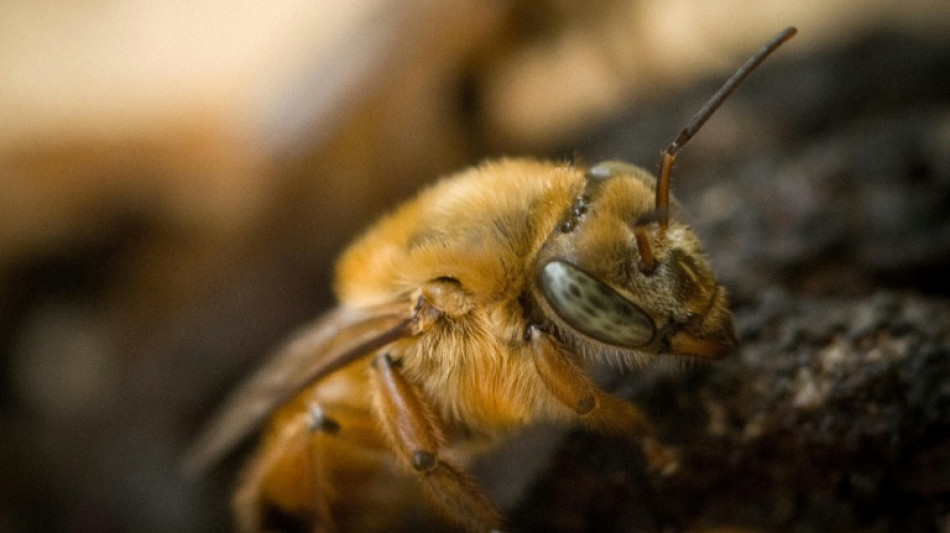
-
 Keller overtime strike gives USA Olympic women's ice hockey gold
Keller overtime strike gives USA Olympic women's ice hockey gold
-
NASA delivers harsh assessment of botched Boeing Starliner test flight

-
 US Fed Governor Miran scales back call for rate cuts this year
US Fed Governor Miran scales back call for rate cuts this year
-
Gu qualifies for Olympic halfpipe final marred by horror crash

-
 Trump issues Iran with ultimatum as US ramps up military presence
Trump issues Iran with ultimatum as US ramps up military presence
-
Peru's brand-new president under fire for child sex comments

-
 UK police hold ex-prince Andrew for hours in unprecedented blow
UK police hold ex-prince Andrew for hours in unprecedented blow
-
Former Olympic freeski halfpipe champion Sharpe crashes heavily

-
 Former Olympic champion Sharpe suffers heavy halfpipe crash
Former Olympic champion Sharpe suffers heavy halfpipe crash
-
Belarus says US failed to issue visas for 'Board of Peace' meeting

-
 Forest boss Pereira makes perfect start with Fenerbahce rout in Europa play-offs
Forest boss Pereira makes perfect start with Fenerbahce rout in Europa play-offs
-
Alcaraz fights back to book last four berth in Qatar

-
 England captain Itoje warns of 'corrosive' social media after abuse of Ireland's Edogbo
England captain Itoje warns of 'corrosive' social media after abuse of Ireland's Edogbo
-
War-weary Sudanese celebrate as Ramadan returns to Khartoum

-
 Townsend expects recalled Scotland duo to shine in Six Nations clash with Wales
Townsend expects recalled Scotland duo to shine in Six Nations clash with Wales
-
Peru's new president under fire for child sex comments

-
 UK king opens London fashion week despite brother's arrest
UK king opens London fashion week despite brother's arrest
-
Belarus frees opposition politician Statkevich

-
 Striking Argentine workers slow down Buenos Aires in protest over labor reforms
Striking Argentine workers slow down Buenos Aires in protest over labor reforms
-
Starlink loss a blow to Russian forces in Ukraine: experts

-
 UN's Sudan probe finds 'hallmarks of genocide' in El-Fasher
UN's Sudan probe finds 'hallmarks of genocide' in El-Fasher
-
Belarus frees opposition politician Statkevich: wife

-
 Rocket re-entry pollution measured in atmosphere for first time
Rocket re-entry pollution measured in atmosphere for first time
-
Airbus ready to build two new European fighters if countries want

-
 Canada makes push to attract skilled migrants, including for defence
Canada makes push to attract skilled migrants, including for defence
-
US threatens to leave IEA if net zero focus remains

-
 Walmart outlines big AI ambitions as it reports mixed results
Walmart outlines big AI ambitions as it reports mixed results
-
Trump kicks off his 'Board of Peace,' as war clouds loom on Iran

-
 UK pubs to stay open late if home nations reach World Cup knockouts
UK pubs to stay open late if home nations reach World Cup knockouts
-
TotalEnergies in high-stakes French trial over climate change

-
 Bosnia probes fascist salutes at Croatian singer's concert
Bosnia probes fascist salutes at Croatian singer's concert
-
US and Israel issue dire warnings to Iran alongside US military buildup

-
 British public cheer Andrew's arrest with a smile and relief
British public cheer Andrew's arrest with a smile and relief
-
Argentine workers go on strike to protest Milei's labor reforms

-
 Nakai targets Olympic skating upset as 'skimo' makes debut
Nakai targets Olympic skating upset as 'skimo' makes debut
-
What we know about ex-prince Andrew's friendship with Epstein

-
 US trade deficit in goods widens to new record in 2025
US trade deficit in goods widens to new record in 2025
-
Oil extends gains on US-Iran tensions, stocks retreat

-
 Williams 'on the back foot' after missing Barcelona: Albon
Williams 'on the back foot' after missing Barcelona: Albon
-
Real Madrid submit evidence to UEFA in Vinicius racism probe

-
 Olympics rev up Milan's renewal but locals fear price to pay
Olympics rev up Milan's renewal but locals fear price to pay
-
Cardona Coll, Fatton win Olympic-debuting ski mountaineering sprint golds

-
 MSF will keep operating in Gaza 'as long as we can': mission head
MSF will keep operating in Gaza 'as long as we can': mission head
-
Russian Filippov wins first medal at Milan-Cortina Games for individual neutral athletes

-
 Italian Milan takes sprint honours at UAE Tour
Italian Milan takes sprint honours at UAE Tour
-
Dozens killed in jihadist attacks in northwest Nigeria

-
 Zimbabwe unbeaten in T20 World Cup after six-wicket Sri Lanka win
Zimbabwe unbeaten in T20 World Cup after six-wicket Sri Lanka win
-
Postecoglou admits taking Nottingham Forest post a 'bad decision'

-
 Switzerland's Fatton wins women's ski mountaineering sprint on Olympic debut
Switzerland's Fatton wins women's ski mountaineering sprint on Olympic debut
-
Kinghorn, Van der Merwe return for Scotland against Six Nations strugglers Wales


Brazil buzzing over potential of its native bees
Brazilian part-time beekeeper Luiz Lustosa lifts the lid on a wooden hive. The reaction is instant, and angry, as thousands of bees envelop him in a buzzing cloud.
Lustosa wears no specialized suit or gloves, however, just a light net to cover his face. These bees are stingless.
"What a wonder!" Lustosa marvels at the honey-filled wax craters in the hive as the bees attack him furiously, but impotently -- his childlike amazement not diminished by six years working with the insects.
Long overlooked, Brazil's native bees are making a comeback, with people such as Lustosa, a 66-year-old public servant, getting in on the movement to boost their profile.
Of 550 stingless bee species known to exist in tropical and sub-tropical areas of the world, some 250 are found in Brazil, according to Cristiano Menezes of Brazil's Embrapa Agricultural Research Corporation.
Yet they are little known outside of rural and Indigenous communities, having been relegated to a lesser place by European and African honeybees brought to Brazil over the centuries for their more prolific honey- and wax-producing skills.
Most of Brazil's honey today comes from non-native, stinging bees.
- 'Here to help us' -
Lustosa is president of the Native Bee Institute, a non-profit organization that plants trees to expand the habitat of native bees and educates people about their important role as pollinators.
"We explain to children that the bees don’t sting, that they are necessary for the environment and nature, and they are there to help us," Lustosa told AFP at the institute's premises in Brasilia, where he runs workshops and sells native honey.
A study in 2016 estimated that about 1.4 million jobs and three-quarters of all crops worldwide depend on pollinators such as bees -- a service rendered for free but worth tens of billions of dollars, according to scientific studies.
Bees account for 80 percent of plant pollination by insects.
Unlike their immigrant counterparts, Brazil's native bees are picky, dining exclusively on the fruit and pollen of indigenous fruit and avocado trees -- for whose pollination they are crucial.
Beekeepers "depend on vegetation, a healthy forest" for the bees to feed on, said Jeronimo Villas-Boas, a fellow native beekeeper and ecologist.
"For this reason, beekeepers are agents of conservation."
Villas-Boas is helping indigenous communities improve the quality of the native honey they produce and links them up with buyers in a bid to get them in on the "business" of the coveted sweet liquid.
"Bees enable businesses with a positive impact on society, the environment and agriculture," says Menezes.
Native bees produce a honey that proponents claim is healthier for its lower sugar content. The flavor and acidity differs from species to species.
They produce about 30 times less honey than their stinging cousins, and as a result, native honey costs about $55 per kilo in Brazil, compared to $6 per kilo for the other.
One of Villas-Boas's clients is Brazilian chef Alex Atala, whose D.O.M. restaurant in Sao Paulo holds two Michelin stars for its locally-based cuisine.
Honey from the tubi native bee is a key ingredient in one of Atala's award-winning dishes of cassava cooked in milk.
"We have a world as rich as that of wine to get to know," Atala told AFP.
"Eating our biodiversity will generate value for products that today are forgotten, devalued."
L.Mason--AMWN


